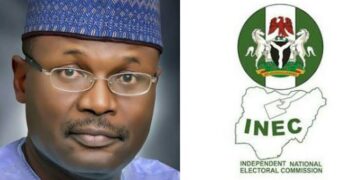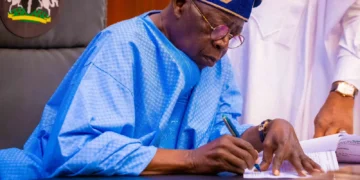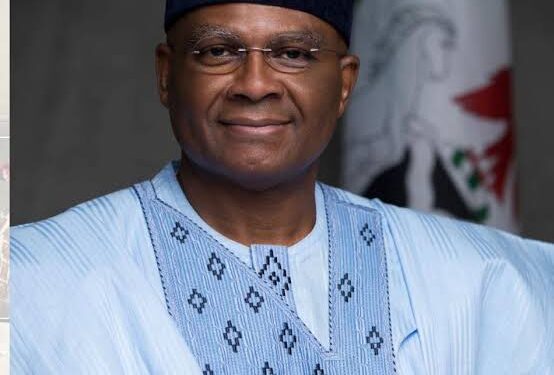FOR SENATOR NNAMANI @ 65, SILENCE IS GOLDEN
By Paul Mumeh
For former Governor of Enugu State and founder of the formidable Ebeano political dynasty, Senator Chimaroke Nnamani, silence is indeed golden at 65.
Senator Nnamani is not your typical Nigerian politician prone to double-speak or cloaked rhetoric. He speaks with boldness, candour, and unflinching conviction—true to both himself and others. He neither equivocates nor masks his positions on pressing national or local issues.
A distinguished foetal surgeon of international repute, Nnamani carved a niche for himself in the United States, where he specialized in the delicate field of medicine for unborn children. A proud alumnus of the University of Nigeria, Nsukka (UNN) medical college, he departed Nigeria to pursue advanced medical training and ultimately built a successful career abroad.
But his foray into the murky waters of Nigerian politics was neither accidental nor haphazard. Entering the political arena in 1997/98, Nnamani was armed with vision, mission, and preparation. From the onset, his ambition was unequivocal—he aspired to govern Enugu State. Yet to the old political guard, he was a novice, a political neophyte.
Prior to 1998, Nnamani had made an earlier attempt to contest for governor under the ill-fated transition programme of General Sani Abacha. Following Abacha’s death, he returned to America to continue his medical profession. However, with General Abdulsalami Abubakar’s democratic transition in 1998/99, Nnamani re-entered the political scene. He contested and won the governorship primaries under the People’s Democratic Party (PDP), and subsequently emerged victorious in the general elections.
Upon assuming office, Nnamani declared:
“I will respect all stakeholders, elders, citizens, and residents of Enugu. I will faithfully implement our manifesto for the common good. I will not compromise the security and welfare of our people. I welcome constructive criticism, but I will resist intimidation or undue pressure that endangers the well-being of our people. In the end, I am accountable to the people of Enugu State.”
He added, “The power we have is the power to do good.”
For eight years, his administration was marked by a firm grip on governance. He wielded authority with clarity and purpose. His vision was to recalibrate the political architecture of Enugu State. He empowered young, dynamic leaders, placing them in strategic positions—an act that ruffled feathers among the entrenched political elite.
His legacy of infrastructural development across Enugu State—spanning health, education, agriculture, roads, and other social amenities—remains a benchmark in public service delivery. His renowned Ebeano Lecture Series, where he incisively analyzed both local and global issues, stands as a testament to his intellectual depth and political acumen.
A consummate orator, Nnamani engages with contemporary and historical issues with remarkable ease and eloquence. He currently serves as a Professor of Obstetrics and Gynaecology at the Enugu State University of Science and Technology (ESUT), continuing his contribution to academia and public discourse.
This paradigm shift provoked the ire of political heavyweights such as Senator Jim Nwobodo, Chief C.C. Onoh, and Dr. Okwy Nwodo. The ensuing battle for the soul of Enugu politics was intense, but Nnamani, through sheer political will, survived and emerged stronger.
To consolidate his influence, he established the Ebeano political family—a movement that unified diverse political interests under one umbrella. Since 1999, nearly every political actor in Enugu—from councillors to lawmakers, ministers, and governors—has emerged from the Ebeano fold. For Nnamani, Ebeano embodies a political philosophy of inclusiveness, where even the son or daughter of a nobody can dream and achieve greatness.
Yet, his journey has not been without betrayal. Despite installing successors like Sullivan Chime and Senators Ike Ekweremadu and Ayogu Eze (of blessed memory), many of his political protégés turned their backs on him when he faced challenges. When support from his allies was most needed, particularly during his encounters with federal authorities, he was left to weather the storm alone.
Although he served in the 6th Senate (2007–2011) and made notable contributions, distractions abounded. After that tenure, he returned to America—a period many referred to as political exile.
But in 2019, he returned triumphantly to the Senate, thanks to the political liberalisation ushered in by then-Governor Ifeanyi Ugwuanyi. In this new chapter, Nnamani became a strong voice for women’s empowerment and gender equity. He championed girl-child education, fought against harmful cultural practices, and advocated for gender balance and equal opportunity.
He also vigorously canvassed for increased federal attention to the Southeast, particularly in project allocation and appointments.
In the face of the controversial “sit-at-home” order imposed by the Indigenous People of Biafra (IPOB), Nnamani stood out as the lone Southeast leader to publicly oppose the disruption. He decried the weekly shutdowns that crippled economic activities and deprived citizens of their livelihoods, arguing that such measures only deepened the region’s marginalisation. His stance, though unpopular, was principled and unwavering.
As the 2023 general elections approached and momentum shifted toward a Southern presidency, Nnamani threw his weight behind APC’s Bola Ahmed Tinubu—his contemporary from the 1999 class of governors. Disillusioned by the PDP’s choice of a 2023 presidential candidate Atiku Abubakar against the popular demand for a southern candidate, Nnamani took a bold and controversial stand. He campaigned openly for Tinubu, enduring criticism from his party and many in the Southeast.
He paid the ultimate political price—sacrificing his Senate seat for a cause he believed in. Whether the Tinubu administration recognises the value of Nnamani’s support remains to be seen.
His decision to support Tinubu’s presidential bid—despite formidable opposition—was a bold affirmation of his steadfast commitment to principle over convenience. While the full outcome of his sacrifice is yet to unfold, his pivotal role in Tinubu’s eventual victory is undeniable.
As it stands, he maintains a dignified silence, preferring reflection over rancour.
Now at 65, Senator Nnamani remains committed to peace, societal progress, and public welfare. As he marks this milestone on May 30, 2025, his enduring belief is clear: silence, when principled and purposeful, is truly golden.
To God alone be the glory.
* Mumeh wrote from Abuja .
Ends…








































